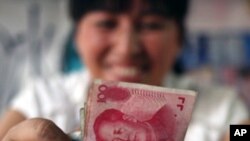A new report from The World Bank predicts that China's renminbi will join the U.S dollar and the euro as dominant international currencies sometime in the next 10 to 15 years. Some economists say is a major realignment in the global economic order, with developing countries playing a more dominant role.
The World Bank report Multipolarity: The New Global Economy focuses on the growing economic power and influence of leading emerging markets that include China, India, Brazil, South Korea, Russia and Indonesia and several other developing countries.
Half of economic growth
Mansoor Dailami, a senior economist at the World Bank says by 2025 those countries could account for about one half of all global economic growth.
Dailami says a major indicator of the country’s future economic growth is the number of companies that invest and do business abroad. He says between 1997 and 2010 the bank identified 10,000 companies from developing countries involved in cross-border transactions.
“That you see more and more companies from India, from China, from Indonesia, from South Africa, from Brazil, from Mexico, these companies are venturing outside in terms of the production, in terms of the investment, in terms of their financing. In short these companies are becoming multinationals,” Dailami explained.
Prominent role
Of the emerging economies, he says China is posed to play the most prominent role in setting global economic policies. Dailami says China is already taking steps to make the renminbi a dominant international currency like the U.S. dollar and the euro.
“It’s a way of China diversifying its huge amount of foreign exchange risk. Right now China as I say is the second largest economy, the largest exports in the world, but China borrows and lends in a foreign currency, not its own currency,” Dailami said.
Reserves
He says China holds $3 trillion in currency reserves and as the dollar continues to drop in value, so too does the value of China's reserves. Establishing the renminbi as an international currency that reflects China's strong economic position, could protect it and other countries from fluctuations in the stagnant economies of Europe and America.
The renminbi is not presently an international currency in part because China does not allow it to be converted at free market rates.
But Dailami says Beijing is moving in that direction by increasingly using renminbi in international transactions and by allowing an off shore market in Hong Kong to issue bonds and banks loans in Chinese currency.
New Report Predicts China's Renminbi Will Be Among Dominant World Currencies




